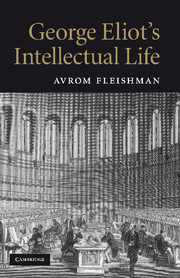Book contents
- Frontmatter
- Contents
- Acknowledgements
- Preface
- Introduction
- 1 The “Evangelical”: starting out in a Christian culture
- 2 The Apostate: moving beyond the Christian mythos
- 3 The Journalist: editing, reviewing, shaping a worldview
- 4 The Germanist: balancing the counterweight of German thinkers
- 5 The Novelist: mixing realism, naturalism and mythmaking
- 6 The Historian: tracking ideals – utopian and national – in Romola and The Spanish Gypsy
- 7 The “Radical”: taking an anti-political stance in Felix Holt
- 8 The Encyclopedist: transcending the past in Middlemarch
- 9 The Visionary: transmitting ideals in Daniel Deronda
- 10 The Intellectual: cultural critique in Impressions of Theophrastus Such
- Notes
- Works cited
- Name index
Preface
Published online by Cambridge University Press: 05 April 2010
- Frontmatter
- Contents
- Acknowledgements
- Preface
- Introduction
- 1 The “Evangelical”: starting out in a Christian culture
- 2 The Apostate: moving beyond the Christian mythos
- 3 The Journalist: editing, reviewing, shaping a worldview
- 4 The Germanist: balancing the counterweight of German thinkers
- 5 The Novelist: mixing realism, naturalism and mythmaking
- 6 The Historian: tracking ideals – utopian and national – in Romola and The Spanish Gypsy
- 7 The “Radical”: taking an anti-political stance in Felix Holt
- 8 The Encyclopedist: transcending the past in Middlemarch
- 9 The Visionary: transmitting ideals in Daniel Deronda
- 10 The Intellectual: cultural critique in Impressions of Theophrastus Such
- Notes
- Works cited
- Name index
Summary
What to call her? The subject of this study changed her name repeatedly during her life, but I shall refer to her throughout as George Eliot, not only for convenience but on a psychological premiss. While modifying her social identity by renaming, she was continuously creating an intellectual identity. “George Eliot” names this evolving self-creation.
This developmental view of Eliot avoids thinking of her as permanently attached to any ideology or definitively influenced by any other thinker. As with all great writers, her mind was marked by independence, a synthetic tendency, and broad sympathy.
A few words on method. My preparation for writing this study involved reading (or reading in) what George Eliot read. As a teacher of mine once remarked, she read “everything” – and what she didn't read, Lewes read. So I haven't read every word she read; considering the dross she had to review, it's not certain that she read every word either. My aim in serving as an intellectual historian has been somewhat different from that of my training as a literary critic. It is the Collingwoodian one, to recreate in my own understanding the mind of the historical subject, to grasp the motivation, content and action of that mind in her writing, both fictional and non-fictional. This is, of course, an unattainable goal, not the less worth striving for. A related methodological concern has been to make it difficult for the reader to discern where I agree or disagree with Eliot's ideas.
- Type
- Chapter
- Information
- George Eliot's Intellectual Life , pp. ix - xiiPublisher: Cambridge University PressPrint publication year: 2010



